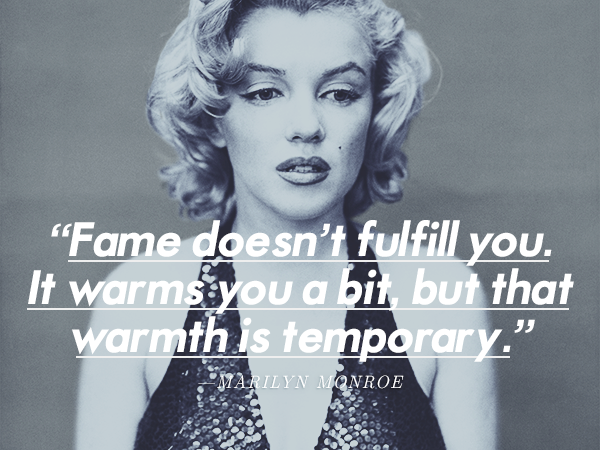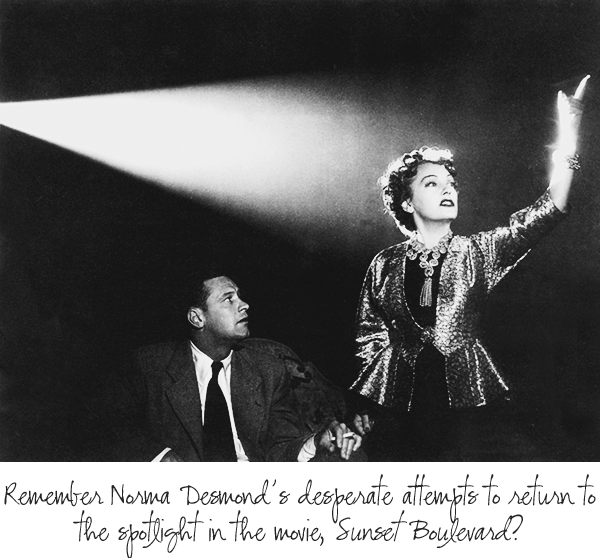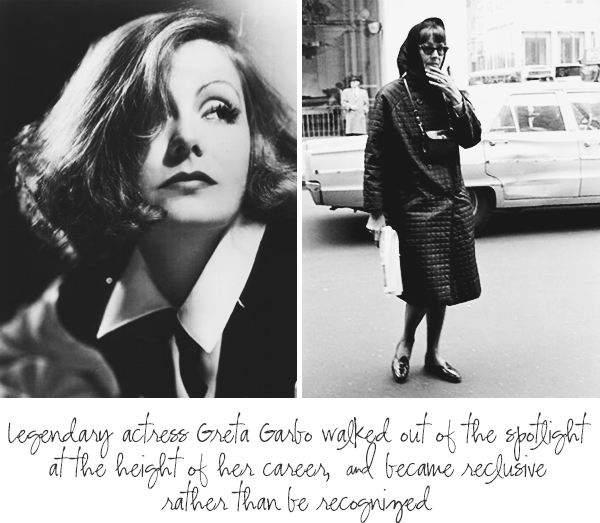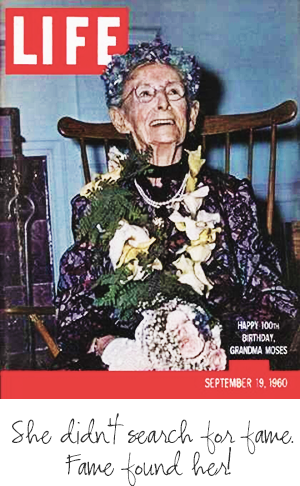This is the story of three real women—one in her late 70s, one in her early 60s, and one in her late 50s—who have either achieved fame, given up fame
or are on an endless quest for it.

Searching for
New-Found Fame
I recently met the woman in her late 70s, whose name is known to most of us over fifty. I’m not going to reveal her identity, however, because what I’m going to say probably wouldn’t delight her. Besides, her identity is less important than what she symbolizes.
This woman has enjoyed a great deal of professional and personal success throughout much of her adult life. I guess you could have even called her a “celebrity” from the 70s through the 90s. But while she has continued to do her craft, and has a great deal to offer others, her “star” doesn’t shine nearly as brightly as it once did. This is not because she’s any less talented now, but simply because the “world” in which she once circulated no longer exists. For one, the media that helped her attain fame—namely newspapers and magazines—don’t have the clout they once did. So even if she’s quoted and her photo appears in the New York Times this morning, no one much cares or thinks about it by noon. Second, she hasn’t created a powerful presence for herself on the Internet. She’s trying, but she lacks the digital marketing savvy she needs. No matter how successful she is at attracting real live audiences when she lectures, in person, that doesn’t translate to a great number of fans on her website or Facebook page.

Now, here’s the rub: This woman yearns for the good old days, when she would draw a crowd around her by just walking into a party, and the next morning her name would appear in all the papers, which only fueled her celebrity status. While chatting about the present, I sensed that her mind was focused far away from our conversation. Oh, she’s darn astute, I assure you, but seemed most “present” when she talked about the past. Part of the reason, I suppose, is that she lost her husband a number of years ago, a man with whom she enjoyed great happiness, both personally and professionally.
What do you suppose drives some of us to seek fame, for fame’s sake, while others derive great satisfaction merely from the act of “doing”, whether or not fame is a byproduct?
What stops this woman from accepting her lower profile in the new digital world and being content to remain healthy and productive?
Forgoing Fame
Now I’m going to tell you about a second woman, in her early sixties, who also enjoyed incredible success, in the financial arena. Her name was invariably high up on every list of the most powerful women in business; she received more awards in her field than Meryl Streep has received in acting, and she even once rode on Air Force One with Bill Clinton. She worked hard and savored the fruits of her labors, from multiple luxurious homes to beautiful clothes and jewelry, from exotic trips around the world to chauffeured limos at home.
Then, in her late 50s, she decided that she’d had enough of corporate politics, non-stop travel, and constant pressure, so she called it a day. Although she sometimes misses her heady former lifestyle, she hasn’t once regretted her decision to leave it. She still uses her business savvy as a member of a number of high-profile corporate boards, but she’s as unimpressed with “fame” as she was when she was “famous.”

Unlike the first woman, this woman very much lives in the present, and relishes every moment of it, from spending more time with her husband to focusing more on her passions, including reading about history. I’d attribute this to her pragmatism; she’s not busy trying to recapture an uncapturable past.
Why do you suppose some of us can voluntarily give up success and “fame” and never look back? What makes a woman like this make the transition with such ease?
Famished For Fame
The third woman, in her late 50s, was mildly successful in the media world, but got off the fast career track after she had her first child. Once her kids were older, she was anxious to get back on and make a name for herself. A popular expression “back in the day,” it meant to become prominent and well-known in a field.
This woman has been obsessed for the last five years with becoming well-known. If she writes a banal blog for the Internet, and it happens to get a fair number of comments, she thinks she’s on her way to “fame.” She talks about most everything she does as if she’s invented a new kind of wheel. Her efforts are always bigger, better and more unique, when, in fact, they aren’t.
When she walks into a room, her eyes dart around to see if there’s anyone there who can help make her famous. She once told someone that she was determined to be the spokesperson for “her generation.” Imagine, one woman thinking she’d become the spokesperson for all of US? We’re the generation that has always managed to speak for itself. Sure, we’ll listen to her opinions and advice,  but hers are not the only opinions and advice that count.
but hers are not the only opinions and advice that count.
This woman’s craving to be well known makes it hard to be around her. Her competitiveness is often insufferable, conduct unbecoming at her age. I almost wish she’d somehow be catapulted to stardom so maybe she’d stop her overbearing demeanor.
Why do you suppose some of us have the driving need to make
up for lack of “fame”
in the past?
Grandma Moses had to stop embroidering at 78, due to arthritis, and friends suggested that she start painting the scenes, instead. A New York collector happened upon her work, and the rest is history. GM wasn’t looking for fame. It found her.
What do two of these women have to prove at their respective ages?
Why do they want fame now?

